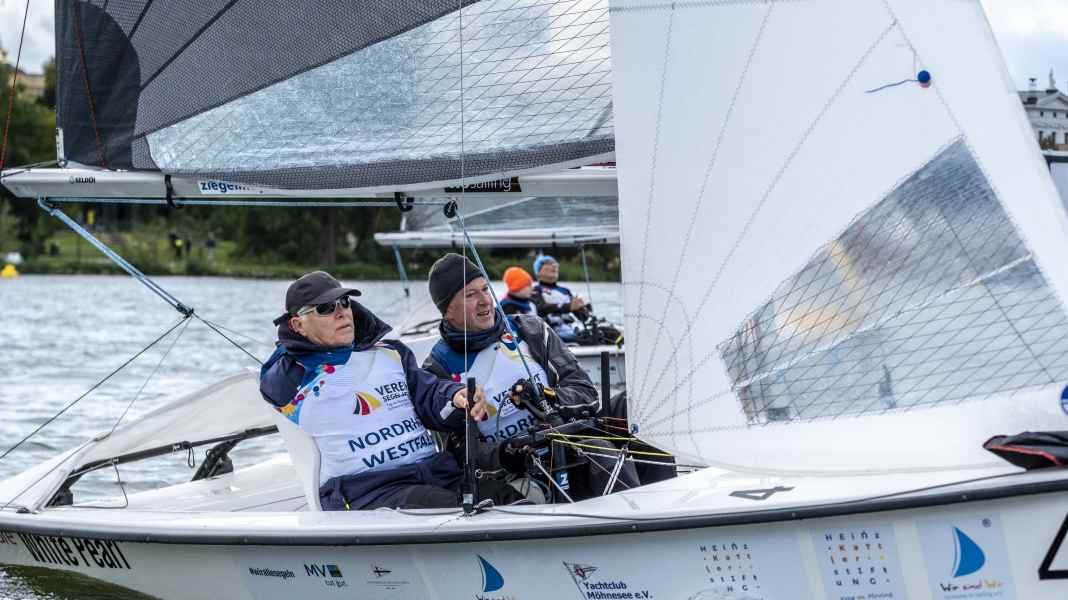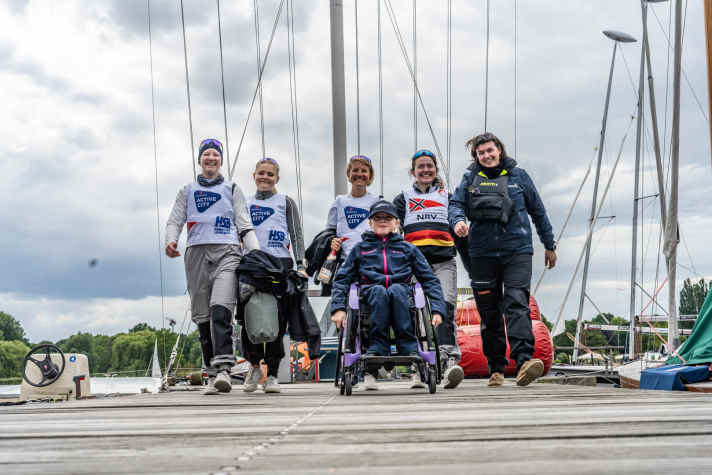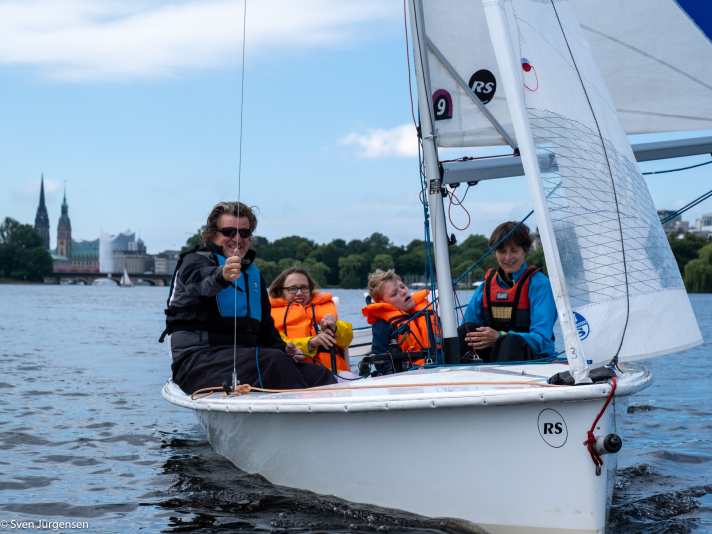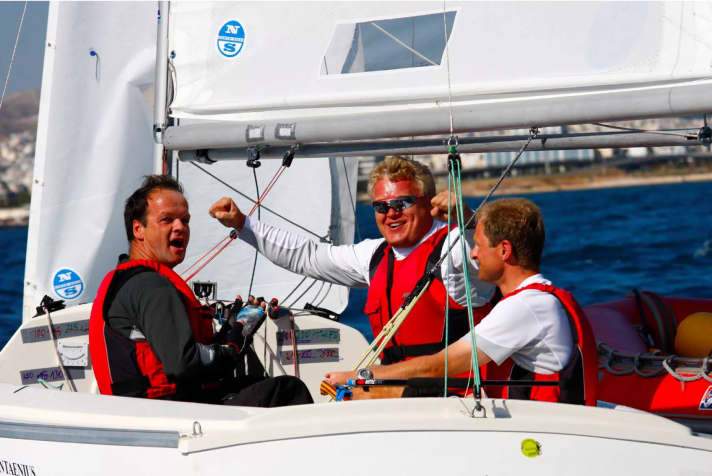
Sailing promotes team spirit, courage and self-confidence - and has long since become one of the most popular inclusive sports. Beyond the still common separation of para-sports and sports for people without disabilities, inclusive sailing brings people together. They learn to sail together or take part in regular, high-calibre competitions - without the special events that used to be the norm. They also promote social interaction.
From the first stroke to the regatta: everything is possible
"We are us - Inclusion in Sailing e.V." is dedicated to inclusion in water sports with sailing courses and projects such as the "BAT Sailing Team". In the crew: blind people and those with visual impairments, deaf people, wheelchair users and people without disabilities. The team is now in its fifth year competing in the J/70 class on the regatta course at Kieler Woche. In 2023, it made the leap into the 2nd German Sailing League, sailed a successful first league season last year and will be competing again in 2025. In addition to the regattas, workshops and sailing courses are regularly on the programme.
Also with the "Helga Cup" The association ensures that more inclusive teams are on the tracks every year - and not by chance, because Sven Jürgensen, one of the leading figures behind "Wir sind Wir", is also the initiator of the world's largest women's regatta. 78 international crews have already registered for this year's event, which will be held from 12 to 15 June at the Norddeutscher Regattaverein on Hamburg's Outer Alster, including 16 inclusive crews.

The "Heinz Kettler Deutschland Cup", a globally unique inclusive sailing series on inland waters and the Baltic Sea, will be held for the third time this summer. This year's cup kicks off on the first day (30 May to 1 June) at the Möhnesee Yacht Club. The second match day will be held in August in parallel with the tour stop of the international sailing competition SailGP in Sassnitz on the island of Rügen. The final on the third match day will take place on 18 and 19 October at the Hamburg Sailing Club on the Outer Alster.
During the Kiel Week From 21 to 29 June, other people with visual impairments and wheelchair users will be taking to the water alongside the ambitious J/70 crews: a sailing course will be offered for blind people and people with visual impairments from 22 to 25 June. The "Henk de Mol", which has been specially modified to meet the needs of wheelchair users, will take wheelchair users on regatta trips. Under professional guidance, they take over the oars and sheets themselves, as watch the video here. Designed on the basis of a Bente 24, the club's boat promises Inclusive Sailing for All e.V. from Kaarst offers a sporty sailing experience for everyone. Those who prefer to have the North Sea wind blowing around their noses can do so at the Sail Bremerhaven from 13 - 17 August.
Children and young people can take part in inclusive sailing courses on Hamburg's Outer Alster from April to October. "Wir sind Wir" offers a total of nine courses in cooperation with Hamburg foundations and support organisations. In addition to learning to sail together, the focus is on providing new, inclusive experiences - everyone learns from each other. For the first time this year, severely disabled children and young people will also be taking part. For more information, please contact sven.juergensen@wir-sind-wir.org.
Finally, there will be an opportunity to find out more about sailing activities and to network at an inclusive summer party on 3 July at the Hamburg Sailing Club.

Support for clubs
With targeted support and start-up assistance for inclusive sailing in clubs, the Foundation "Turning Point" people of all ages - especially young people - with mental or physical disabilities, but also socially disadvantaged people. Jens Kroker, one of the most successful Paralympic sailors in the world with three Paralympic medals, heads the foundation. It sees itself as a sailing platform for inclusion. He and his team provide advice and support to clubs interested in inclusion as well as people with disabilities who want to sail.
Four inclusive sailing courses, aptly named "turning courses", are firmly on the programme each year. The events are aimed at clubs that already have initial experience with inclusive sailing activities, have the necessary infrastructure and would now like to integrate disadvantaged people into club life more intensively and systematically - both in sporting and social terms. Each of the three-day sailing courses is thoroughly planned by the foundation's team and club members, from recruiting participants to logistical processes and catering to planning long-term sailing activities. On each sailing day, two trainers accompany four young sailors on the foundation's own Sonar boats. This year's tacking courses will take place from 23 to 25 May at the Essener Turn- und Fechtklub e.V.from 13 to 15 June at the Munich Yacht Club e.V. and from 1 to 3 August at Lake Cospuden near Leipzig.

Funding opportunities for inclusion in sailing
There are many funding opportunities for clubs that want to realise inclusive sailing projects. In addition to professional support from initiatives such as the "Turning Point" foundation, they can also receive private or public funding. For example, the Bavarian state government recently provided the Prien sailing club with over 10,000 euros for inclusive sailing programmes. The club can use the funds to improve its infrastructure; as with most other clubs, the work of the club members is purely voluntary. Clubs can enquire about specific funding programmes for inclusion projects from their regional associations, local authorities or the German Sailing Association. Aktion Mensch has its own funding programme and a list of all sponsors of inclusive sport These include those that provide 100% funding for the programmes, thus relieving the often tight club budgets of the need to make their own contribution.
Inclusion and disabled sport
The inclusive approach in sailing differs fundamentally from traditional disabled sport. While disabled sports often have separate competitions and training groups for people with disabilities, inclusion aims to allow people with and without disabilities to sail together. This not only promotes sporting exchange, but also mutual understanding and the removal of barriers in society. Inclusive projects show that mixed teams can successfully take part in regular competitions and blur the boundaries between disabled and mainstream sport.

